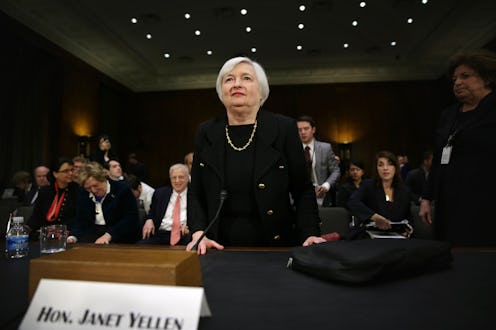News
What It Means To Be In The Janet Yellen Era
On Monday morning, four months after President Obama nominated Janet Yellen, his former monetary advisor, as his pick for Federal Reserve chief, 67-year-old Yellen was sworn into her new position as Chairman of the Federal Reserve. Yellen is the first woman to ever lead the U.S. central banking system, but she's played down her role in breaking gender barriers, asking to be called "chair" rather than "chairwoman," and declining to comment publicly on her history of smashing glass ceilings. By doing this, Yellen is sending a message: Her focus, first and foremost, is on rebuilding the economy.
Yellen has an uphill battle ahead of her: the U.S. economy grew by 1.9 percent in 2013, an embarrassing downturn from 2.8 percent in 2012. So what can we expect from Yellen?
Well, the job of the Fed Reserve is twofold: to stimulate job growth while also keeping inflation low. A generation of Fed leaders, in particular Bernanke, have only managed to keep the latter under control. This has led to criticism that the issue of joblessness is still not being properly tackled. Though Yellen served alongside the prior Fed leaders and won't be a staggering break from form, she does lean more to the left than her predecessors in terms of monetary policy. (Because of her approach, Wall Street types call her a "dove," rather than a "hawk.")
Yellen is a strict believer in what's called the Phillips curve, which means a direct inverse relationship between the rate of inflation and the rate of unemployment. In short, Yellen's focus is on encouraging job growth, and she's indicated that she'll allow for increased inflation if it means more jobs become available for Americans.
The impact of this can't be underestimated: Though the unemployment rate is making slow gains, some speculate that this is because many long-unemployed citizens have simply stopped looking for jobs. Obama has been promising job growth for most of his five-year presidency, but the job market is still clawing its way out from the — a point that Mitt Romney tried to capitalize on during his 2012 run for president.
Job growth isn't the only thing that sets Yellen apart from the pack. Believe it or not, the last few Democratic presidents have nominated Republican Chairs of the Fed Reserve, and Yellen will be the first Democrat to serve as chair in decades. And when fellow Democrat Lawrence H. Summers briefly rose as her opposition for Fed Chair, there was huge backlash from Obama's Democratic lawmakers, who for years had viewed Yellen as the most promising candidate for Bernanke's successor.
And that situation might offer a clue as to why Yellen, unlike powerful female counterparts like Sheryl Sandburg and Marissa Meyer, rarely speaks publicly about her position as one of the world's only enormously powerful females. Obama has received flak for leaning towards male leaders when compiling his administration, and there's no denying that his nomination of Yellen, and the Democratic Party's wholehearted support of her, makes the White House and the Democrats appear supportive of gender equality. (Of course, you'll know by now that she's been completely qualified for this role for about a decade.)
This is in stark contrast to how the Republican Party has been perceived in their approach to women. (Binders full of women, anyone?) With that in mind, it's not hugely surprising that Yellen wants to be more than the Democrat's token female: Her goal is to to drag the American economy from the gutter and be known for strong leadership, which will see her carving out a path for women without fanfare.
But there's no doubt that Yellen is moving mountains for female leadership. She's from humble beginnings in Brooklyn, N.Y., and was the only woman in her PhD class at Yale University — and is now one of the most powerful females in the world. Watch out, unemployment. We're in the Yellen Era.
